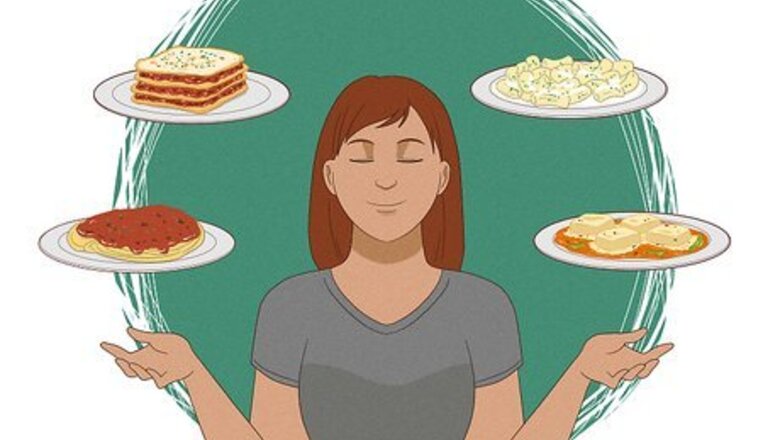
views
Joining the Church of the Flying Spaghetti Monster
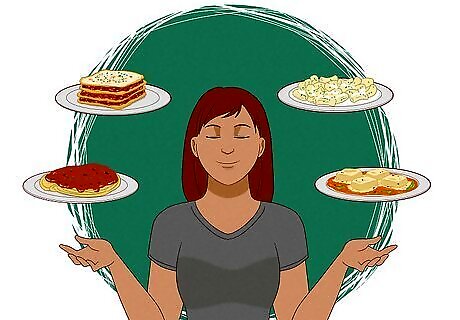
Simply wish to join the church! That's it—according to the official website for the Church of the Flying Spaghetti Monster (FSM), all that's needed to become a Pastafarian is to want to be one. You do not need to: Participate in any sort of ceremony Pay any sort of fee Make any sort of promise or pledge Give up your current religion Know anything about Pastafarianism Have a literal belief in the FSM

Learn the basic beliefs of Pastafarianism. So you've just become a Pastafarian by willing yourself to be one? Great! Now's the perfect time to learn what you've just signed on for. The following are some of the fundamental pillars that make up the beliefs of the Pastafarian religion—however, you don't have to literally believe in them to be a member: The supreme deity is known as the Flying Spaghetti Monster (FSM). He is an invisible, omnipotent, omniscient eternal being that takes the form of a giant clump of spaghetti with two meatballs and eyes. He created the entire universe in four days, then rested for three. Pirates are considered holy beings. According to the religion, pirates help fight global warming and protect against natural disasters. Every Pastafarian should strive towards pirate-hood. Pastafarian heaven is a land of "beer volcanoes and stripper factories." Many adherents believe that it will accommodate the desires of every person, so the volcano can also produce non-alcoholic drinks, and the stripper factory will accommodate personal preferences, including preferences related to gender or whether to interact with the strippers at all.
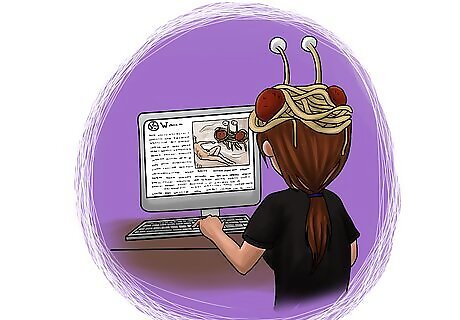
Study the sacred texts of Pastafarianism. For a great introduction to your new religion, try browsing any of the Pastafarian scriptures. The most important book to Pastafarians is the Gospel of the Flying Spaghetti Monster. The Quill Award-nominated Gospel was published in 2006 following an open letter by author Bobby Henderson to the Kansas State Board of Education that satirically protested its ruling requiring the teaching of intelligent design in public schools. The Gospel discusses the various aspects of Pastafarian belief in depth, making it indispensable for new members. Another major Pastafarian holy book is The Loose Canon (available online), which includes religious stories, guides for everyday life, prayers, and the writings of numerous important figures in the church such as Captain Jeff.
Following the Principles of Pastafarianism
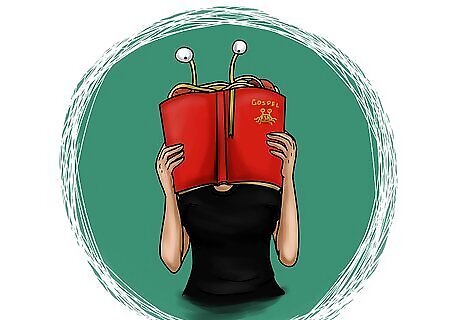
Follow The Eight "I'd Really Rather You Didn'ts." This set of rules (also known as the Eight Condiments) given to the pirate captain Mosey by the FSM himself provides the basic code of behavior for all Pastafarians. There were originally 10 rules, but Mosey dropped and broke two on his way down the mountain, which accounts for Pastafarians' "relaxed" moral standards. The eight surviving rules are: "I'd Really Rather You Didn't Act Like A Sanctimonious, Holier-Than-Thou Ass When Describing My Noodly Goodness." "I'd Really Rather You Didn't Use My Existence As A Means To Oppress, Subjugate, Punish, Eviscerate, And/Or, You Know, Be Mean To Others." "I'd Really Rather You Didn't Judge People For The Way They Look, Or How They Dress, Or The Way They Talk, Or, Well, Just Play Nice, Okay?" "I'd Really Rather You Didn't Indulge In Conduct That Offends Yourself, Or Your Willing, Consenting Partner Of Legal Age AND Mental Maturity." "I'd Really Rather You Didn't Challenge The Bigoted, Misogynist, Hateful Ideas Of Others On An Empty Stomach." "I'd Really Rather You Didn't Build Multi-million Dollar Churches/Temples/Mosques/Shrines To My Noodly Goodness When The Money Could Be Better Spent (take your pick) Ending Poverty, Curing Diseases, Living In Peace, Loving With Passion, And Lowering The Cost Of Cable. "I'd Really Rather You Didn't Go Around Telling People I Talk To You." "I'd Really Rather You Didn't Do Unto Others As You Would Have Them Do Unto You If You Are Into, Um, Stuff That Uses A Lot Of Leather/Lubricant/Las Vegas. If the other person is into it, however (Pursuant To #4), then have at it."

At every available opportunity, talk like and/or dress as a pirate. In Pastafarianism, pirates have a status similar to saints in Christianity or bodhisattvas in Buddhism. In fact, the mere existence of pirates is said to prevent natural disasters. All Pastafarians are encouraged to adopt the dress, speech, and behavior of a pirate, especially if they are going to be preaching the holy word of the FSM. Pirates typically dress in flamboyant, colonial-era clothing, with ruffled shirts, bright jackets, bandanas, and eye patches being common. Pirates enjoy beer, grog, romance, the high seas, and anything that can get them a day off of work.
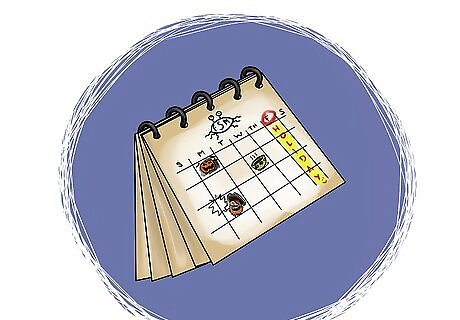
Celebrate Pastafarian Holidays. Like any religion, Pastafarianism has its own yearly holidays. These special days call for joyous celebration, humble reflection, and special devotion to the FSM. A brief calendar of the most important days in the Pastafarian calendar can be found below: Every Friday: Friday is the sabbath day for Pastafarians. However, it doesn't require any sort of special effort—Pastafarians may celebrate this day by "drinking beer and relaxing." Ramendan: A month of sacrifice during which Pastafarians eat only pasta and noodle dishes after sundown. Start and end dates vary from year to year. Pastover: Pastafarians enjoy a feast of pasta, dress as pirates, and participate in a ritual passing of the eye patch. Date varies from year to year; usually in March or April. Talk Like a Pirate Day (September 19th): Self-explanatory. Pirate costumes are recommended but not required. Halloween (October 31st): Pastafarians are obliged to dress like pirates. "Holiday:" Pastafarians celebrate a vaguely defined Christmas-like event in late December (no specific date is given by the church) any way they like, but especially with pasta, pirates, and beer.
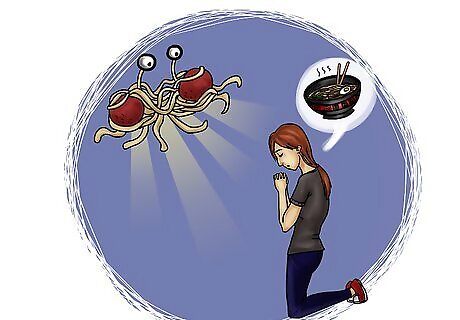
Pray to the FSM. Devout Pastafarians may choose to pray on the Friday sabbath, every day, or whenever they feel like it—there are no strict rules about when and where to pray. Though Pastafarians have major figures have written several commonly-used prayers, you don't need to use these—any sincere prayer (even one you make up on the spot) will be received by the FSM. If you choose to pray, end all your prayers with the holy word "Ramen." Here's just one Pastafarian prayer—you can find many more online. Prayer of Knowledge Grant, the Flying Spaghetti Monster, thy sauce; and in sauce, noodles; and in noodles, meatballs; and in meatballs, knowledge; and from knowledge, knowledge of what is tasty; and from knowledge of what is tasty, the love of spaghetti; and from spaghetti, the love of the Flying Spaghetti Monster. Ramen.
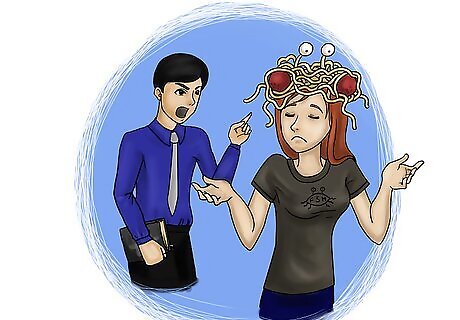
Do not persecute anyone who does not believe in the FSM. While Pastafarians are encouraged to spread the good word of the FSM in their daily lives, they are not allowed to harass, bully, or otherwise bother people who don't accept the FSM. Not only is this against several of the I'd Really Rather You Didn'ts, it's also just plain rude and not in line with the relaxed, pasta-eating, live-and-let-live philosophy of Pastafarianism. Note that this rule isn't just for people of other religions who consider Pastafarianism a heresy—it's for atheists and agnostics as well.

Most of all, have a good time. Pastafarianism is designed to be a religion that its followers can enjoy. While followers of the FSM range from the extremely casual to the devoted, none should take their Pastafarian beliefs so seriously that they can't crack open a beer on a Friday afternoon the way the FSM intended in his infinite wisdom. Don't get stressed out about anything related to practicing Pastafarianism—remember, it's a religion with a holiday called "Ramendan." If beer and pasta do not suit you, there is no pressure to partake. The FSM understand your dietary restrictions and personal preferences. Find something else that you enjoy.
Becoming a Master of Pastafarianism

Choose which Pastafarian sect suits you. Pastafarians who wish to deepen their faith may eventually choose to join a sub-sect of the religion. These sects interpret the word of the FSM differently, leading to different practices and beliefs for their members. Unless a sect breaks one of the I'd Really Rather You Didn'ts, there's no "right or wrong" sect to be in—it's a matter of personal preference. Two of the biggest sects in Pastafarianism are the Orthodox and Reformed sects. Orthodox believers tend to have more conservative, literal views of Pastafarian beliefs, while Reformed believers tend to be more open to allegorical meanings. For instance, many Reformed Pastafarians believe in Automated Creationism, which is the idea that the FSM sparked the creation of the universe with a single event (the big boil), then let natural processes eventually create life. Orthodox Pastafarians, on the other hand, believe that the FSM deliberately and literally created all things.
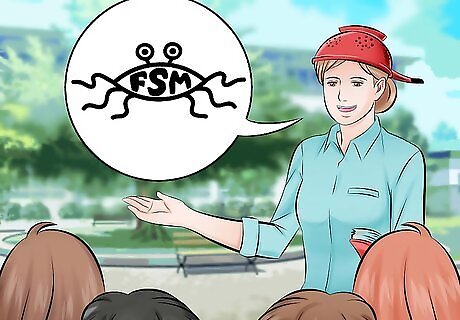
Spread the church's good news with FSM propaganda. The Church of the FSM encourages its members to promote its message so long as this does not lead to harassment or persecution of others. One of the most popular ways to do this is to distribute propaganda in the form of flyers, booklets, brochures, and so on. Official propaganda materials from the church are available here. You may also make your own propaganda materials if you wish. However, make sure your materials are consistent with Pastafarian doctrine. It wouldn't be appropriate, for instance, to pass out flyers saying "The Flying Spaghetti Monster hates people who follow other religions." This isn't true—the FSM accepts people of all faiths.

Get ordained as a Pastafarian Minister. Ready to stop being a follower in the Church of the FSM and start being a leader? Becoming an officially-ordained minister is easy and can be done online here. You will need to pay $59 to receive your official certificate and have your name added to the register of ministers.

Attempt to have your religion recognized by a government agency. Heroes of the Pastafarian faith don't give up when they're told that they don't belong to a "real" religion. Getting your religion officially recognized by local, state, or national government agencies is one of the bravest, most self-sacrificing things a Pastafarian can do. Not only does it increase awareness of Pastafarianism, it also helps to illustrate the arbitrary nature of other religions' special privileges in society. One good way to do this is to wear a pasta strainer on your head in official photographs. The following are some examples. In 2013, Czech Pastafarian Lukas Novy won a legal battle to wear a strainer on his head for his government ID photo, citing religious reasons. In 2014, Christopher Schaeffer became the first openly Pastafarian politician in the U.S. when he wore a strainer while being sworn in to the Pomfret, NY Town Council. Shawna Hammond was allowed to wear their religious headwear for her driver's license photo in Oklahoma. Jessica Steinhauser demonstrated her religious freedom by wearing her metal colander on her head for her driver's license photo in Utah. In 2015, the New Zealand Government approved the church's application to conduct marriage ceremonies.



















Comments
0 comment